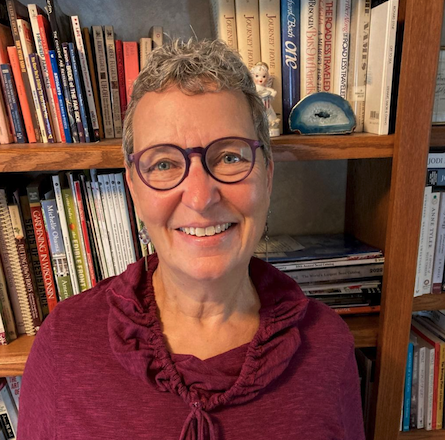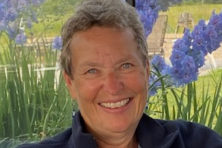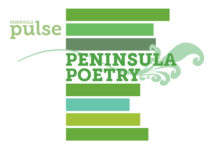Peninsula Poetry: A Conversation With Carrie Sherrill
- Share
- Tweet
- Pin
- Share

Carrie Sherrill has lived in Door County for 24 years. She is a retired RN and caterer by trade, but has always written and dabbled in poetry. She has a degree with an emphasis on Creative Writing from the University of Wisconsin-Green Bay. The past two years, Carrie and her husband Peter, also a poet, have facilitated the Art/Speaks writing events at various galleries throughout the county – events that are a part of the many writing opportunities provided by Write On, Door County. Carrie’s poems have been published most recently in the Wisconsin Fellowship of Poets calendar, Moss Piglet, and Bramble. She facilitates and participates in readings around Door County, and said her poetry group has provided much needed ongoing support and encouragement of her work.
What is your writing routine? I do not have a set time of day for writing, but I do try to free-write at least a couple of pages every day. Then I let the pages percolate for a while, and when I go back, I can find the words, phrases and images that I can incorporate into a finished piece. Usually, the poem will require some research or further writing and review by my poetry group before I consider it finished.
What do most poorly written poems have in common? Well, that’s a loaded question! For me, a poem must connect in some way with the reader. It could be a shared experience, place or feeling. Poems that are too abstract are not for me, and I don’t like poems that try to fit themselves into forms in which they are obviously uncomfortable. If, after reading the poem a few times I am still asking myself, “So what?” I do not have much use for it.
What do most well written poems have in common? Well-written poems are understandable, use interesting words and phrases, and grab the reader’s attention. Generally, these poems have layers of meanings and appeal to different readers in different ways. I do appreciate the use of forms in poems if the poems fit naturally into the required structure. These are the poems that I love to read on paper, aloud, and share with friends. They call me back.
Is it important to understand the meaning of the poem or for the reader to be able to “solve” it? The reader must be attracted to the poem in some way. Either they can identify with it, or sometimes it can even make them uncomfortable. The meaning found by the reader may be different than the meaning intended by the writer, but that is OK. There are not concrete “answers” to a poem, like there are to crossword puzzles. And meaning may change over time and in different circumstances.
What book are you reading right now? I am working on writing exercises from Steve Kowit’s book, In the Palm of Your Hand: The Poet’s Portable Workshop. I am reading Ann Heyse’s historical fiction book, The Light is Ours, for the second time (I enjoyed it so much the first time and I am now reading it aloud to my husband who is visually impaired). I have also been studying the short poems by Ted Kooser.
Peninsula Poetry is a column curated by the Door County Poets Collective, a 12-member working group that was formed to publish Soundings: Door County in Poetry in 2015 and continues to meet.
If You Believe It, It Will Come
“Out on the edge of darkness, there rides a peace train.” Cat Stevens
I’ve been waiting fifty years
waiting at life’s station
waiting for the whistle, loud and clear
waiting for the train to appear.
I can almost see it in the distance
with its painted peace signs
hippies hanging out the windows
“Love One Another” banners flying.
I want to believe
something good has begun
I can see it in the children
in the helpers, in the teachers
in the dreamers who
Dream about the world as one
Jump on Everyone, jump on
Let’s ride this peace train
Let it take us all
Home again.
–Carrie Sherrill
My Back Against the Wall
I can still feel the cool wall against
my back, my head, as I crouched
in the hospital stairwell
tears, hot on my cheeks
finally let loose
in this moment alone
After the parents held
their deformed stillborn
After the doctor expressed
his curt condolences
After I carried the blanketed infant
to the morgue
My back, against this wall
an unexpected solace
in this cold, hard profession.
–Carrie Sherrill



